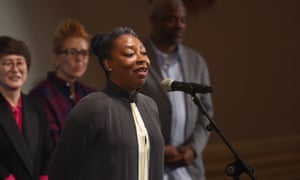[ad_1]
Otobong Nkanga is doing away with boundaries. Surveying the blank expanse of the Tate St Ives extension under its softly diffused light, she explains that more than 100 of her works will be shown without any partition walls, withdrawing the visual cues that would traditionally make order of an exhibition as big as hers.
For a show exploring the politics of empire, of land acquisition and environmental damage, of borders and ownership, it seems a deliberate and poignant choice. Nkanga, who was born in Nigeria and lives in Belgium, has been creating exciting, multi- disciplinary work for almost 20 years.
She has been described as “a future great … with keen visual intelligence” by Art Review and a powerhouse by the Chicago Tribune. From Where I Stand – her first museum show in the UK – is also the first this grand in scope for a black female artist in the Tate galleries. Is she nervous?
“A museum show is a place to really try out work. People enter into a focused space,” she says, relaxed but excited. To that end, she is producing a new wall painting, freehand and unplanned, and has included her most provocative pieces: a tapestry entitled The Weight of Scars, and multimedia installations, The Pursuit of Bling and Tsumeb Fragments. The mining of the world’s natural resources, the colonisation of Namibia and the exploitation of black bodies are themes Nkanga builds on.
“One of the things I worry about is that some people will just look [at my work] and think, ‘Oh, floods? Corruption? Parliament is burning down? That happens to those people,” she says. “Even if you’re working from a place trying to connect history, it’s like [some audiences] have a part of the brain that is shut down to never understand that they are also involved and connected.
“So they think: ‘Yes, people in the Bahamas are the ones who suffer hurricanes. People in Nigeria or India or whatever, they have problems.’ That is considered ‘normal’. But the funny thing is that it’s coming closer. Some of it just hasn’t yet touched here.”

Photograph: Felix Hörhager/dpa
Nkanga’s mother was a teacher in Lagos and her father worked in communications. The family home burned down when she was a child, and she had lost both parents by the time she was 17. With her older sister, she looked after their younger brother, but still fulfilled her childhood ambition of attending art school, studying at the Rijksakademie in Amsterdam, and going on to exhibit across the world. She has won multiple awards and prizes, including the Sharjah Art Foundation prize over the summer, and will be the inaugural recipient of a major new award, to be announced next week.
“I don’t think about generational traumas,” she says of her work centred around the colonisation of Africa. “I know they are there, but I was brought up to keep moving forward. Life is not there to be pleasant – you make it pleasant because everything around you is not in favour of you and you’re very conscious of that. You can’t be defeated by life, you have to grab it.”
At the moment, Nkanga is going through the process of applying for Belgian nationality. She has lived in Europe for more than 20 years and has a Dutch husband, but says Trump, Brexit and “the heat of white extremists burning up” has worried her.
“Even for this show, we started work 18 months ago but I couldn’t come over. The application is hell, it’s over 20 pages.”

She snorts at the notion that the gallery might deal with her visa application. “You have to do it yourself. Does the gallery know the names of my grandparents? Where I have been in the last 10 years? Do they know how much I have in my bank account and whether I can afford to come over?” The UK operates a dehumanising process, she says, and one that artists like her expect to get worse.
“Alarm bells went off in 2016 … One finds it very difficult from the perspective of the west to put themselves in the shoes of people [like me],” she says. “It always seems like something foreign to them.”
[ad_2]
READ SOURCE


